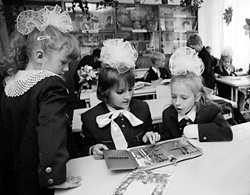Grade School: Personality Factory?

Not so long ago, the Research Tutorial Center Intellect presented its findings on reading and writing to develop critical thinking. The Day has acquainted its readers with the experiment. (see Klara Gudzyk’s article in The Day, No. 44, November 30, 1999). The number of its exponents has increased over the past six months. Considering that the project is nearing its second year in Ukraine, summing up seems in order. The project is being tested for certification in twenty countries as part of the George Soros Foundation network.
Students and teachers using these techniques note that they simply enjoy the process. Apart from everything else, it gives one extra confidence, and the teaching process becomes far easier and more effective.
What is the difference between this and conventional teaching methods? In terms of components, almost all were applied previously or are being used. There is, however, one thing. Outwardly insignificant, in my opinion, it is the core of the project: the teacher’s role in the learning process, nonexistent from the traditional standpoint.
A number of teachers persist in using the old authoritarian style; others prefer to be more democratic, but even then the teaching process remains authoritarian. Try to picture a schoolteacher who does not judge, never saying what is right or wrong — in other words, never imposes his/her opinion. And who, in addition, does not teach but merely organizes the process of mutual understanding. So why is the class so happy? Rather than getting a lecture with all the problems solved and conclusions explained, every student has to work hard to solve these problems and work out their own inferences. I think what makes them happy is that they work and see the results of their work. Also, because every student knows that all the others expect to see what he or she can do. During such classes no one can just sit back and watch, because everybody is a member of the team and nonparticipation means letting the team down. Everybody feels needed by every one else and the results of everybody’s performance are self-evident. This is what makes everybody happy.
In other words, a seemingly insignificant change in the teacher’s role in class turns the authoritarian method of instruction into a democratic one.
Why is it easier for students? Perhaps, because during classes they learn to practically use the laws of logic, albeit having no idea about logic as a science. They learn not to divide the world into black and white but perceive it as an extremely complicated range of colors and shades, noticing positive and negative aspects about any given object or phenomenon. They learn how to formulate their own ideas and defend them using all the facts they can grasp from reality, doing so relying only on their own resources. And everybody must respect everyone else’s opinion. “Even if I hate your ideas I will do my best to listen you out,” wrote a girl in innovative teacher Olha Vlasenko’s class.
This method of instruction forms personalities capable of working out their own views and respecting those of others, mastering the skill of communicating with their fellow human beings and maintaining fruitful cooperation, intellectually and emotionally advanced, prepared for scientific discoveries, with a mind protected against manipulation. Last but not least, such personalities will always seek to improve themselves by correcting every mistake they notice.
Naturally, the project needs the finishing touches, particularly in terms of assessment. Here evaluating the total amount of knowledge and practical skills is not enough. One must find criteria to assess the students’ intellectual and creative potentialities — in other words, criteria making it possible to determine the strength of the spring which, when uncoiled, will lend acceleration to the process of cognition and self-improvement for the rest of one’s life. This is the subject Oleksandr Kocherha, senior instructor at Kyiv’s Interregional Institute for Advanced Teachers’ Training, is working on. Natalia Kravchenko, director of the Intellect Center, says the experiment is underway and several more groups of teachers will undergo training this fall, using new the methods. To say that Ukraine’s current educational system is conservative would be perhaps incorrect, as Ukrainian teachers are increasingly active in the international democratic pedagogical movement.






